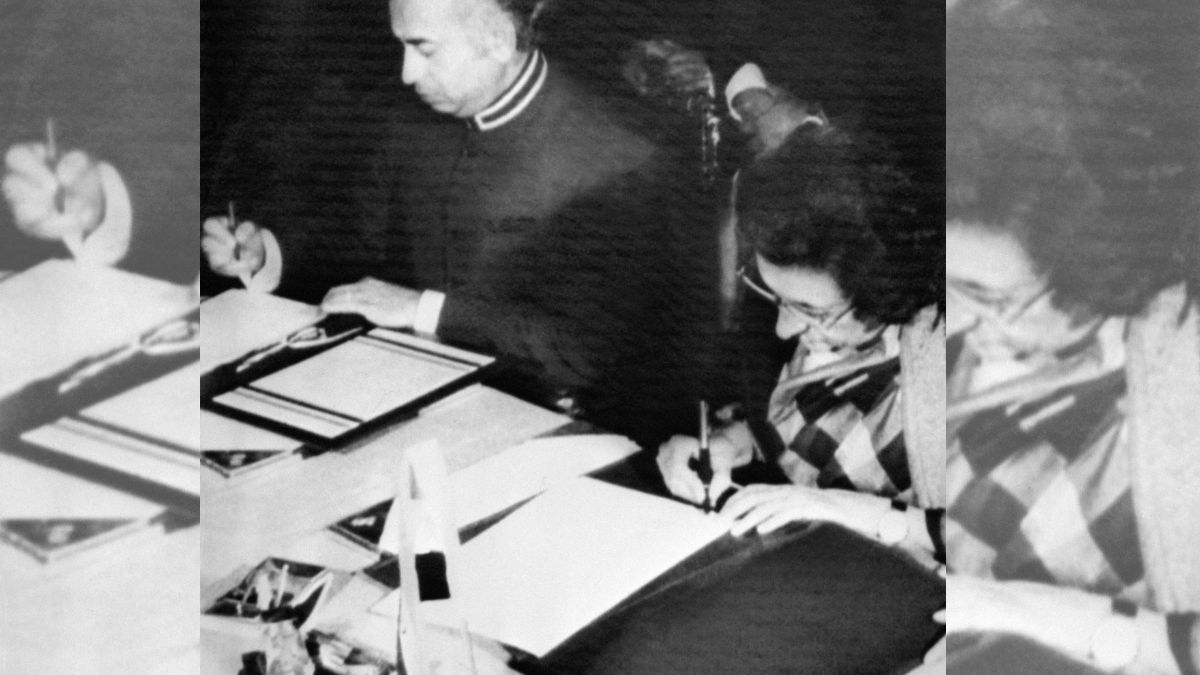Pakistan has responded to India’s diplomatic steps against it in the wake of the terror attack in Jammu and Kashmir’s Pahalgam. Islamabad on Thursday (April 24) announced the suspension of trade, bilateral accords and airspaces with India.
After a meeting of the National Security Committee (NSC) led by Pakistan Prime Minister Shehbaz Sharif, the South Asian nation also cancelled all visas under the SAARC Visa Exemption Scheme (SVES) issued to Indian nationals, except for Sikh pilgrims. It has also decided to reduce India’s diplomats and staff at the Indian High Commission in Islamabad to 30.
In a step that could have wider ramifications, Pakistan has suspended the 1972 Simla Agreement with India. “Pakistan shall exercise the right to hold all bilateral agreements with India including but not limited to Simla Agreement in abeyance,” Dawn reported, citing a statement by Pakistan’s Prime Minister’s Office (PMO).
What is this pact and why is it significant? We will explain.
1972 Simla Agreement
India and Pakistan signed a key agreement in 1972 that marked a formal end to hostilities after the 1971 war between the two nations that led to the creation of Bangladesh.
The pact was signed by then Prime Minister Indira Gandhi and Pakistan President Zulfikar Ali Bhutto on July 2, 1972, at Barnes Court – now known as Raj Bhavan – in Himachal Pradesh’s Shimla. The accord was finalised after days of negotiations between the two sides.
The bilateral agreement entails both countries’ commitment to a peaceful, bilateral resolution of their disputes. It aims to “put an end to the conflict and confrontation that have hitherto marred their relations and work for the promotion of a friendly and harmonious relationship and the establishment of durable peace in the sub-continent.”
“The principles and purposes of the Charter of the United Nations shall govern the relations between the two countries”, the treaty says, referring to the founding document of the United Nations.
India and Pakistan decided to resolve their disputes by “peaceful means through bilateral negotiations or by any other peaceful means mutually agreed upon between them.”
“Pending the final settlement of any of the problems between the two countries, neither side shall unilaterally alter the situation and both shall prevent… any acts detrimental to the maintenance of peaceful and harmonious relations,” the peace treaty states.
It further says that “the basic issues and causes of conflict which have bedevilled the relations between the two countries for the last 25 years shall be resolved by peaceful means”.
To bring “durable peace”, the Indian and Pakistani governments agreed to withdraw troops to their side of the border.
The two nations vowed to “respect each other’s national unity, territorial integrity, political independence and sovereign equality”. They also agreed to resume “communications, postal, telegraphic, sea, land including border posts, and air links including overflights”.
ALSO READ: Revealed: After the Pahalgam massacre, a once-classified CIA report exposes Pakistan’s fear of India
Why it matters
Pakistan keeping the
Simla Agreement “in abeyance” is significant. As per the key pact, the ceasefire line in Kashmir that was established on December 17, 1971, became the
Line of Control (LoC).
The two governments said in the treaty that the LoC would “be respected by both sides without prejudice to the recognised position of either side”. “Neither side shall seek to alter it unilaterally, irrespective of mutual differences and legal interpretations.”
“Both sides further undertake to refrain from the threat of the use of force in violation of this line,” it further states.
Despite the treaty in place, both sides interpret it differently. While India says that Kashmir is a bilateral issue, according to the Simla Accord, Pakistan has raised the matter on international forums like the UN.
India refers to the pact to reject any third-party mediation in Kashmir and insists on bilateral talks with Pakistan.
The suspension of the peace treaty could further increase hostility between the two countries. Pakistan violated the Simla Agreement during the 1999 Kargil War when intruders from the country crossed the LoC and took control of heights in the Kargil district of Kashmir.
The Simla Agreement has failed to establish peace between the two neighbours and some argue that its time has come.
With inputs from agencies


)

)
)
)
)
)
)
)
)



